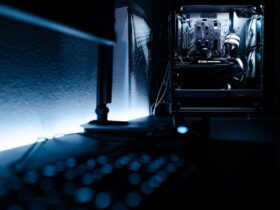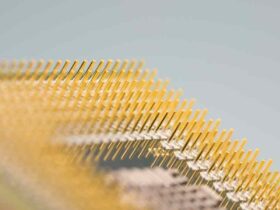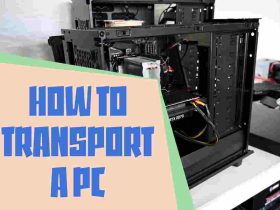Are you in the market for a new hard drive for your PC? A hard drive is an essential part of any computer, serving as the main storage area for all of your data and programs. But with so many options out there, it can be difficult to know which hard drive to choose. Before you make a purchase, it’s important to understand some of the basics of hard drives and the different types available. This article will provide an overview of the different types of hard drives, as well as the benefits and drawbacks of each, to help you make an informed decision. So if you’re wondering whether you need a hard drive for your PC, read on to find out!
Do You Need A Hard Drive For A Pc?
Yes, you do need a hard drive for a PC. A hard drive is a storage device that stores all of your data, such as your operating system, applications, photos, music, videos, and other files. Without a hard drive, your computer would not be able to run any software or save any data. A hard drive typically consists of two components: the physical drive and the storage media. The physical drive is the actual hardware device itself, which is usually housed inside the computer’s case. The storage media is the medium on which the data is stored, such as magnetic disks or solid-state memory.
How To Choose A Hard Drive?
Storage Capacity
One of the first factors you should consider when deciding on a new hard drive is storage capacity. The storage capacity is measured in gigabytes (GB) or terabytes (TB). The higher the capacity, the more data the drive can store. For example, if you are looking to replace a 500 GB drive, you can select a 1 TB drive instead. You will now have double the amount of storage space. Most computers are designed to use a certain amount of storage space, so you will want to make sure you select a hard drive with a high enough capacity to store all of your data. If you have a large amount of data, such as music or video files, you will want to select a drive with a high capacity to store all of your data. Similarly, if you are planning to use your hard drive to store large amounts of data, such as for a business, you will want to select a drive with a large capacity so that you can store as much data as possible.
Speed
Another important factor to consider when choosing a hard drive is its speed. The speed of the hard drive is often measured in rotations per minute (RPM). The higher the RPM, the faster the hard drive is. Generally, the faster the hard drive is, the more expensive it is. You can select a slower hard drive and still get the job done. However, if you want to improve the performance of your computer, a faster hard drive can help. Computer performance is measured in terms of computer processing speed, random access speed, and data transfer speed. The computer processing speed is how quickly your computer can process instructions. The random access speed is how quickly your computer can access data stored on the hard drive. The data transfer speed is how quickly information can be transferred between two devices. A faster hard drive can help improve all three areas of computer performance. If you want to improve the performance of your computer and speed up your computer’s boot-up time, you can select a faster hard drive.
Reliability
Another important factor to consider when choosing a hard drive is its reliability. The reliability of the hard drive is often measured by the annual failure rate. The annual failure rate is the rate at which the hard drive fails during the course of one year. Higher annual failure rates indicate lower reliability and vice versa. When choosing a hard drive, you want to make sure that it is highly reliable since all of your data is stored on it. If your hard drive fails, you could lose all of your data. If you are working on a tight budget and want to save money, you can select a lower-end hard drive. However, if you can afford it, you may want to consider purchasing a higher-end hard drive. Higher-end hard drives often come with additional features and better reliability compared to lower-end hard drives.
Price
Another important factor to consider when selecting a hard drive is its price. Generally, higher-end hard drives are more expensive than lower-end hard drives. If you are working on a tight budget and need to save money, you can select a lower-end hard drive. However, if you can afford it, you may want to consider purchasing a higher-end hard drive. Often, higher-end hard drives come with additional features and better reliability compared to lower-end hard drives. Selecting a hard drive based on price alone may not be the best decision. You may want to consider the different factors outlined in this article and then select the hard drive that best suits your computer’s needs. You want to make sure that the hard drive you select is the best one for your computer.
Different Types Of Hard Drives
- There are many different types of hard drives on the market today. The type of hard drive you choose will depend on your specific needs and budget.
- While there are a few different types of hard drives, this article will focus on the three types that are most commonly used today:
- Mechanical Hard Drives (HDDs), Solid State Hard Drives (SSHDs), and Solid State Drives (SSDs).
Hard Drive Installation
- Installing a hard drive onto your computer is a fairly straightforward process and can be done by most people with a little bit of computer knowledge. Before getting started, make sure you have all of the necessary tools and parts.
- These typically include a screwdriver, your new drive, and a data cable. The first thing you’ll want to do is determine where you want to place your new drive.
- While almost any computer has room for a drive, you might need to remove an existing one to make room. Once you know where you want to put your drive, take it out and put the new one in its place.
- Next, plug in the data cable. This will transfer data from your old drive to the new one. It’s important to do this in the correct order to avoid data loss. First, plug in your old drive. Then plug in the new drive. Finally, transfer the data from the old drive to the new one.
Benefits Of Hard Drives
- There are many benefits of using hard drives. First, they can store a lot of data. This can be helpful if you are using your computer for work, storing large files like photos or videos, or if you have a large music collection.
- You can also use them to store programs and other computer data. Hard drives are widely available and relatively inexpensive.
- In addition, they are durable and reliable. They are designed to withstand daily use and last for years. They also function well even in extreme temperatures.
- Finally, they are easy to use. Simply plugging in the drive and accessing the data on it is simple.
Tips For Using Your Hard Drive
- There are a few things you can do to get the most out of your hard drive. First, make sure you are storing your data correctly.
- Be sure to label your data and store it in a safe place. You can also try backing up your data. This can help protect against data loss.
- Finally, try to avoid plugging in additional drives or devices to your computer. This can reduce the speed of your computer, making it less effective.
- Finally, you can protect your data by encrypting your hard drive. This will keep your data safe from cybercriminals and other online threats.
Conclusion
If you’re in the market for a new hard drive, it’s important to know your options. There are three types of hard drives that are most commonly used today: Mechanical Hard Drives (HDDs), Solid State Hard Drives (SSHDs), and Solid State Drives (SSDs). Each type of hard drive has its own benefits and drawbacks, so it’s important to understand the differences before making a purchase. Hard drives are an excellent storage option, but you do need to maintain them to get the most out of them.















